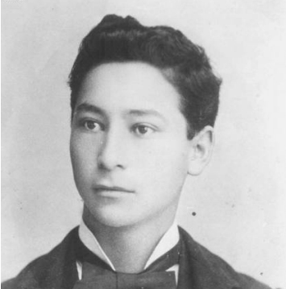Song of the Oktahutche
Far, far, far are my silver waters drawn;
The hills embrace me loth to let me go;
The maidens think me fair to look upon,
And trees lean over glad to hear me flow.
Thro’ field and valley, green because of me,
I wander, wander to the distant sea.
Thro’ lonely places and thro’ crowded ways;
Thro’ noise of strife and thro’ the solitude,
And on thro’ cloudy days and sunny days,
I journey till I meet, in sisterhood,
The broad Canadian, red with the sunset,
Now calm, now raging in a mighty fret!
On either hand, in a grand colonnade,
The cottonwoods rise in the azure sky,
And purple mountains cast a purple shade
As I, now grave, now laughing, pass them by;
And birds of air dip bright wings in my tide,
In sunny reaches where I noiseless glide.
O’er shoals of mossy rocks and mussel shells,
Blue over spacious beds of amber sand,
By cliffs and coves and glens where Echo dwells—
Elusive spirit of the shadow-land—
Forever blest and blessing, do I go,
A wid’ning in the morning’s roseate glow.
Though I sing my song in a minor key,
Broad lands and fair attest the good I do;
Though I carry no white sails to the sea,
Towns nestle in the vales I wander thro’;
And quails are whistling in the waving grain,
And herds are scattered o’er the verdant plain.
This poem is in the public domain. Published in Poem-a-Day on November 20, 2022, by the Academy of American Poets.
“Song of the Oktahutche” was first published in Twin Territories vol. 2, issue 5 (May 1900). The poem personifies the North Canadian River of eastern Oklahoma, known also by its Muscogee Creek name, Oktahutche, which translates to “Sand Creek.” Matthew Wynn Sivils, in the introduction to Song of the Oktahutche: Collected Poems (University of Nebraska Press, 2008), counts the poem among “the best poetry by any poet from that period.” Similarly, Posey’s biographer, Daniel F. Littlefield Jr., considers the poem to be “one of his best-known poems.” In a gloss of the penultimate stanza, Sivils writes, “These words reveal the complex character of Posey’s literary imagination. His poetry—drawing upon romantic, European, and Euro-American influences such as Robert Burns and John Greenleaf Whittier—becomes a sort of Indian Territory pastoral, a literary terrain in which Echo, the Greek nymph, shares a river with Stechupco, the ‘Tall Man’ spirit of the Muscogees.” Though the Oktahutche was one of Posey’s “dearest literary subjects,” as Sivils writes, he ultimately drowned on May 27, 1908, while attempting to cross it.

